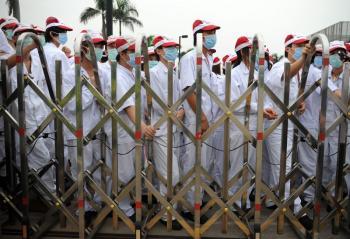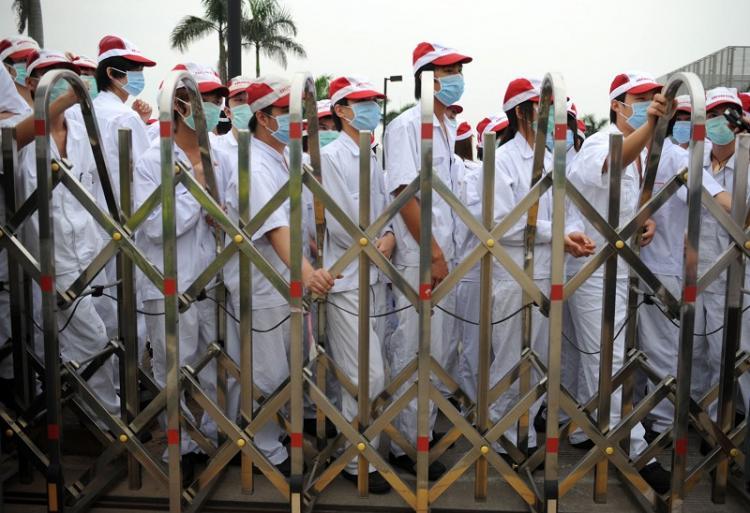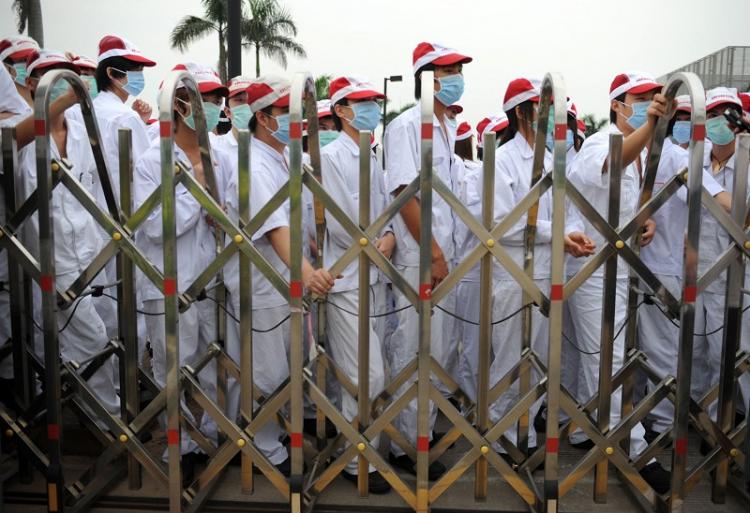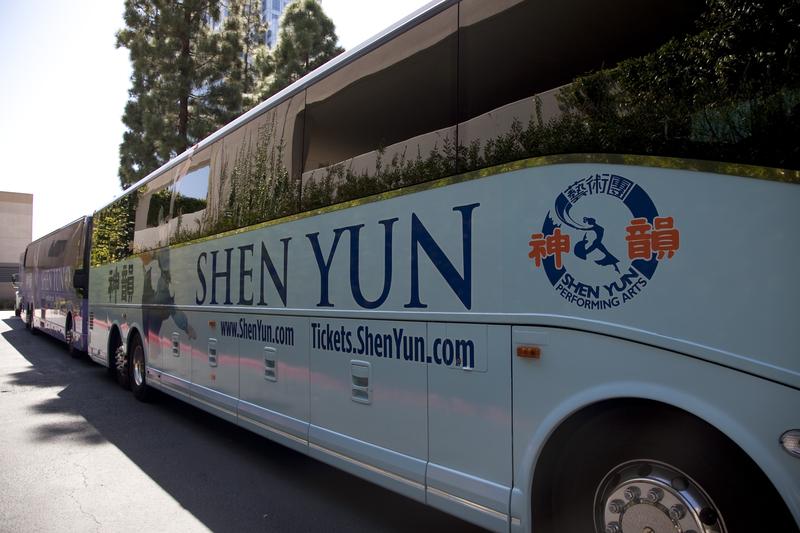A wave of strikes in Chinese factories recently has highlighted the lack of authentic rights for Chinese workers and other inequities in Chinese society. In response, the regime is launching a “Strike-Hard” campaign.
According to China analysts, the recent wave of strikes is a reflection of simmering social discontent and unrest as a result of social inequality, injustice, and rising inflation. Many of the striking workers are not only demanding pay raises, but are also asking for independent unions.
If the strikes escalate they may threaten China’s position as the factory of the world, and thus threaten the communist regime’s popular legitimacy and survival. However, experts say that responding to the workers demands with brute force will not work.
On June 13 the Chinese Ministry of Public Security announced that it will launch a seven-month-long “Strike-Hard” campaign to “crack down on violent crimes that seriously affect the public’s sense of security” as China goes through an economic transition and social transformation.
Rising labor rights awareness
Xu Yimin, a migrant workers’ rights activist in Jilin Province, in his blog called for an independent labor union, stating that the string of suicides at Foxconn and the subsequent strikes across the country were mainly due to “workers having no voice, rights, or means of expression.”
New Tang Dynasty Television (NTDTV) said in a June 24 report that last year, migrant rural workers from northeastern Jilin Province applied to authorities to form their own union but were rejected.
Around the same time the state-run All-China Federation of Trade Unions released a report warning that young migrant workers are increasingly willing to make demands from the state, a development construed as “a test for stability in the country.”
Official unions suppress strikes
Labor unions in China are state-controlled and generally side with the management and local communist officials, instead of representing workers. Thus, while on the surface it appears that the regime has allowed the recent strikes to take place, it was actually only in foreign-owned companies that workers were permitted to strike, according to a recent analysis in The Epoch Times.
The report found that, “The greatest benefit [the regime] stands to gain by allowing [the strikes] is a better international face for its political system - protests allowed at multinational enterprises could make it seem to the world that the regime is changing its policies of clamping down on even the most fundamental of people’s rights.”
Among the several-dozen plants where strikes took place in May, two serve as examples of the very different outcomes: the Japanese-owned Honda factory in Foshan, Guangdong Province, and a Chinese-owned and operated cotton mill in Pingdingshan City, Henan Province.
Honda workers eventually claimed victory and received pay raises, while striking workers at the Pingdingshan cotton mill were brutally cracked down on by 2,000 to 3,000 police on June 1.
However, workers in both plants accused the government-backed unions of suppressing the striking workers.
“The union is worse than the mafia,” workers at the Pingdingshan cotton mill told Asia Weekly.
Workers at the Honda plant said the official local union took workers’ money but suppressed the strike with violence. The workers therefore demanded the reorganization of the existing local union and reelection of the union chairmen and relevant personnel.
Media black-out
At the same time the Communist Party superficially acquiesced to the strikes at the foreign-funded manufacturing plants, China’s Minister of Commerce played down their significance in comment to state media.
And while Chinese media devoted ample coverage to the Honda workers’ strike in May, BBC China and Hong Kong’s South China Morning Post recently reported that China’s Central Propaganda Department has issued an order to kill domestic media coverage on the subject.
Regime facing challenges
A number of China experts say the regime is launching the “Strike-Hard” campaign in response to the raft of social challenges that threaten its leadership, credibility, and survival.
Economic and political commentator Jason Ma said in a commentary program on NTDTV that for years tension and social conflicts under communist rule have been accumulating, and are now beginning to surface. This can be seen in the spate of the school killings, the recent strikes, and the desperate and violent resistance to forced demolition exhibited by Chinese citizens over the past few months, he says. Mr. Ma argues that this all makes the regime worried that public discontent will boil over.
Apart from those ructions, inflation and the high cost of living are of daily concern to China’s workers.
Over the last two months inflation in particular has grown rapidly, and violence by the state is being used to deter violence on the part of the citizenry, according to Mr. Ma. The “Strike Hard” campaign exemplifies this mindset, he says, and with it the regime seeks to tighten control for at least the next seven months.
Dr. Showing Young, an Associate Professor of the Department of Business Administration at National Sun Yat-Sen University in Taiwan, also said that out-of-control inflation will eventually hit China and force low-income Chinese workers to revolt. With the proliferation of cheap modern communication technologies, the regime will find it increasing difficult to suppress Chinese workers from organizing protests and strikes, Mr. Young said.
Both Messrs. Ma and Young warned that using violence to maintain stability may eventually backfire.
Professor Guo Yuhua of the Sociology Department at Beijing University feels similarly, and says she is furious with local governments suppressing striking workers. She told Asia Weekly that it’s time to reexamine the notion of stability.
“The regime thinks suppression can solve problems, yet only by protecting people’s rights can stability be maintained,” Prof. Guo said.
Prof. Guo also said that since the Chinese Communist Party was built on the worker and peasant class, if the regime does not handle the strikes well the ruling party may further erode its popular legitimacy.
Meanwhile, strikes have continued into June, at Denso Corp., the Toyota supplier in Guangzhou on June 21; Toyoda Gosei in Tianjing on June 17; and Honda Lock in Zhongshan, Guangdong Province on June 9, among others.
The Chinese labor unrest has also been noticed among union officials in the U.S. According to a June 14 Reuters report the AFL-CIO, America’s largest labor union, is considering asking the Obama administration to investigate whether China gains an unfair trade advantage by denying workers’ rights.




